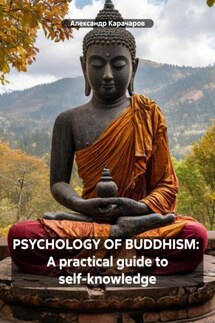PSYCHOLOGY OF BUDDHISM: A practical guide to self-knowledge - страница 5
"Consciousness creates very diverse Worlds of living beings and Worlds of vessels. It is said that all beings are born through action – karma. Having rejected consciousness, we have no action – karma."
Everything we see and feel is a reflection of the workings of our minds. It is said that all beings are born through their actions, their karma. But if we give up consciousness, then there will be no karma itself.
Imagine an artist who, with the help of a brush and paints, creates an entire universe on canvas. Our mind is a brush, and our thoughts and intentions are paints. What picture do we paint with our life?
In a meeting with Western scholars in 1991, His Holiness the Fourteenth Dalai Lama emphasized, like a wise teacher:
"There are two main reasons why it is important to understand the nature of the mind. First, there is a fundamental connection between the mind and karma, our actions. Second, the state of our mind plays a crucial role in how we experience happiness and suffering."
This wisdom, like a jewel, is especially relevant in our rapidly changing world. We often look for happiness in external things, forgetting that the true source of joy and peace is within us, in our own minds.
To understand this truth more deeply, imagine the parable of two monks who met a woman who did not dare to cross a turbulent river. One monk, without saying a word, carried her to the other side. The second monk, who followed him in silence, after a while broke down and asked, "Brother, are we not forbidden to touch women?" The first monk replied, "I left this woman on the bank of the river a few hours ago. And you seem to be carrying it to this day."
This parable, like a mirror, reflects how our minds can cling to impressions and thoughts, even when events have long passed. And it is this clinging that often becomes the source of our suffering.
Therefore, the study of the mind is not just an academic exercise, but an urgent necessity in order to learn how to manage our lives, to free ourselves from the shackles of suffering and to find true happiness. Just as a gardener tends his garden by pulling weeds and watering flowers, we can learn to purify and transform our minds in order to cultivate virtues and wisdom that lead to awakening. But every step of the way brings us closer to understanding ourselves and to living a more harmonious and happy life.
Definition and Nature of Mind
So, we have found out that the study of the mind is like a key that opens the door to understanding ourselves and the world around us. But what is the mind? How to identify this elusive entity? In Buddhist psychology, the mind, or consciousness, is described as having two key characteristics, like the two wings of a bird: clarity and the ability to know.
His Holiness the Dalai Lama, like a wise teacher, explains this inner connection very figuratively:
"Knowing nature, or knowing agent… is called the mind, and it is immaterial… Cognitive acts have the nature of knowledge because of the basic nature of clarity, which underlies all cognitive acts. This is… the basic nature of the mind, clear light."
Imagine a pure, transparent crystal. It has clarity – you can see through it, as if through an unclouded spring. And at the same time, he is able to reflect light and images like a mirror – he has the ability to know. Our mind is like this crystal. It is clear in nature, which allows us to be aware of and perceive the world around us, like a window open to reality. And he has the ability to know – to see, to hear, to feel, to think, like a sensitive instrument that registers all impressions.






